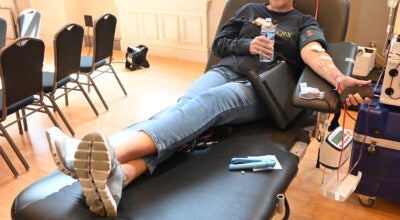RCCC OKs new dean for biotech
Published 12:00 am Wednesday, May 27, 2009
By Emily Ford
eford@salisburypost.com
KANNAPOLIS ó It’s a pretty good time to become the dean of biotech at Rowan-Cabarrus Community College.
Dr. Martha H. Corjay won approval Tuesday as RCCC’s new dean of biotechnology, science and math, just three days before the college breaks ground on a $26 million, state-of-the-art building at the N.C. Research Campus.
With the area’s growing interest in biotech, Corjay said she sees an opportunity to make science education more accessible.
“We can do that right here, in the community college setting,” she said. “We can make it not frightening.”
RCCC’s new 62,000-square-foot building in Kannapolis will house the college’s biotech programs, considered crucial to the success of the $1.5 billion Research Campus.
The college will train the campus workforce and tailor programs to meet the needs of major employers at the mill village-turned-life sciences hub.
Corjay said she looks forward to making science less intimidating.
“We can change the image of science,” she said. “We can put a friendly face on it.”
RCCC recently reorganized its faculty and departments after cutting 21 positions in response to the state budget crisis.
Before the reorganization, the college devoted one dean to the arts and sciences and one to biotechnology.
“Under the new organization we will unify the sciences, math and biotech areas to support one another,” RCCC President Carol Spalding said in a statement.
Corjay joined RCCC’s faculty in June 2008 as head of the college’s associate-degree program in biotechnology. She has more than 10 years of research and development experience in industry and five years of college-level teaching experience.
She worked as a principal research scientist with DuPont Pharmaceuticals Co., staff fellow with the National Institutes of Health and graduate research assistant at the University of Virginia. She has 23 scientific peer-reviewed publications and holds a U.S. patent.
The RCCC board of trustees also approved Yolanda S. Wilson as dean of liberal arts and general education and Tina M. Haynes as human resources director.
Wilson comes to RCCC from Mitchell Community College in Statesville, where she is assistant director of developmental education and coordinator of the college’s quality enhancement program.
“Both of our new deans bring outstanding experience that will complement our college’s new direction,” Spalding said.
Haynes works as a human resources consultant and is certified by the Society of Human Resource Management. She spent much of her career with Wachovia in various executive positions, part of her resume that appealed to RCCC.
Haynes “brings a wealth of experience and years of professional training to the college,” Spalding said. “She will augment our existing small department and help us move forward as we implement more technology into our practices.”
In other business:
– Trustees agreed to contract with Optima Engineering to serve as the commissioning agent for Building 400, going up at the Salisbury campus. The contract will be between $15,000 and $25,000 after negotiating the scope of work.
To pursue LEED certification for Building 400, RCCC must have a commissioning agent. The structure will be one of the first LEED-certified buildings in Rowan County. LEED certification provides independent, third-party verification that a building project is environmentally responsible. Contractors will use 21 percent recycled content in the building, and at least 35 percent of construction materials will be purchased regionally.
Already, Summit Developers has diverted 871 tons of material from the landfill during site clearing, RCCC Vice President Jerry Chandler said.
– Trustees approved a preliminary budget resolution, including nearly $3 million from the state for lease payments and operational expenses at the new building on the Research Campus.
The allocation shows “a true commitment” from the state to RCCC, Spalding said.
– Summer enrollment has increased dramatically this year, up 56 percent to more than 3,000 students.
RCCC is offering more courses traditionally and online, as well as increasing capacity in each class, said Gaye McConnell, vice president for student services. Classes do not overlap, so students can take additional courses, she said.
The high demand comes in part from four-year college students home for the summer who can’t find a job.
– The RCCC Foundation has three finalists for a new part-time director position.
– At Saturday’s graduation, RCCC will honor board member Newton Cohen with the Distinguished Service Award.
– All RCCC employees will see their pay cut by .5 percent in May and June as part of the state’s furlough program, in exchange for up to 10 hours of time off.



